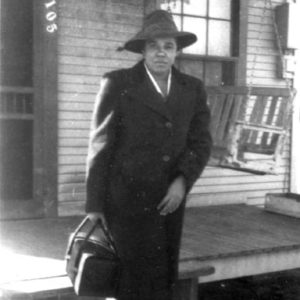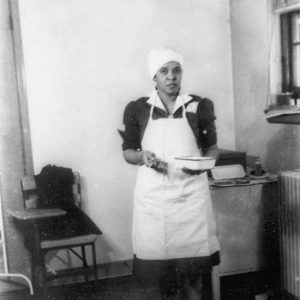calsfoundation@cals.org
Mamie Odessa Hale Garland (1910–1979)
Mamie Odessa Hale Garland served as midwife consultant for the Arkansas Department of Health from 1945 to 1950 and is credited with training the state’s elderly and illiterate “granny midwives” to ensure that they knew the proper techniques to manage the medical aspects of pregnancy, labor, and delivery and could complete birth certificates. Her contributions led to Arkansas’s improved maternal/infant mortality rates and regulation of midwives.
Mamie Odessa Hale was born November 19, 1910, in Keeny’s Creek, West Virginia. She was the third child born to Emanuel Hale and Minnie Maude Creasy Hale. In 1941, Hale attended the Tuskegee School of Nurse-Midwifery for Colored Nurses in Alabama, a program sponsored by the Children’s Bureau; a bachelor’s degree was required to enter the school, but no information on where she received her training is available. The Bureau was legislatively established in 1912 to investigate and report on all matters pertaining to child welfare. After graduation, Hale began her career in public health nursing in 1942 when she was hired to work in Arkansas for the Crittenden County Health Department, where she assisted local public health nurses with educational programs for midwives.
Arkansas’s maternal/infant mortality statistics during the 1940s emphasized the racial discrepancies between white and black women. The infant mortality rate for white infants was relatively stable, forty-four per thousand live births in 1939 and forty-three in 1940. The rate for black infants was seventy-three for both years. By 1944, the maternal mortality rate for African American women was two and a half times as high as it was for white women in the same year.
In the 1940s, midwife births were common, as less than twenty-five percent of births in Arkansas occurred in hospitals. During World War II, the state suffered a loss of physicians and nurses to the war effort, leaving black and white women to rely heavily on granny midwives. After the war, black women continued to be delivered primarily by granny midwives, who attended almost seventy-five percent of all black births.
The Arkansas Medical Society became concerned with the excessive loss of life among black women and their babies and considered abolishing midwifery to reduce infant mortality. That was not a viable solution because few hospitals outside Little Rock (Pulaski County) provided beds for black maternity patients, and physicians at the time received little if any public funds for attending home births. Despite past attempts to regulate midwives, in 1941, almost one-third of the state’s midwives not only had no permit for the year but had never had one. In 1945, the State Board of Health was charged with regulating the midwives by increasing their supervision and adopting regulations against those practicing without a permit.
On July 1, 1945, Hale was appointed to the position of midwife consultant for the Arkansas Department of Health by Dr. Frances Rothert, Director of Maternal-Child Services. Hale’s responsibility was to train the largely illiterate and elderly midwives, supervising them at the time of delivery, improving their birth registration, and promoting their registration. Failure to complete the birth registration process resulted in infants not having a birth certificate. Less than twenty-five percent of the babies delivered by granny midwives at that time received a birth certificate.
The state had received funding from the Children’s Bureau to establish a statewide training program to supplement the midwife classes conducted by local health units. The goal was to issue an annual permit to every practicing midwife. Hale initiated educational programs in the Conway, Faulkner, Lonoke, and St. Francis counties. Classes were held in churches and schools and were highly publicized so that the communities would be informed about the need for midwives to have a permit.
The classes proved challenging because at least seventy-five percent of the midwives were illiterate, and only five percent could satisfactorily complete a birth certificate. Hale used innovative methods such as songs, movies, pictures, and demonstrations with a thirty-pound mannequin to teach the appropriate techniques for managing prenatal care, preparing for the delivery, performing aftercare, completing a birth certificate, and seeking medical supervision. Midwives who attended all lectures and met state requirements received permits at graduation ceremonies. Midwives were expected to undergo a medical examination, complete a pledge card, possess a midwife bag equipped according to instructions of the state health department, and complete an application for a midwife permit. A graduation ceremony was held at which graduates would recite a pledge stating that they would complete a birth certificate for every child and obey all regulations.
In 1943, there were an estimated 1,565 midwives practicing in the state. Six years later, that number would drop to just 1,000 midwives with permits who attended 5,026 births, seventeen percent of the state’s infants born that year. By 1948, Hale’s efforts led to the establishment of maternal-child health clinics in eleven counties, with more than 2,500 women receiving maternity care. In 1949, more than half the state’s counties with public health nurses were offering some type of maternity or child health clinic. As the public came to expect midwives would have permits, many midwives were no longer able to practice. By 1950, midwife classes were conducted in thirty-two counties, and midwives with permits accounted for seventy-five percent of all midwife births. The Board of Health encouraged patients to use supervised midwives, and the number of deaths due to pregnancy and childbirth fell from 128 in 1930 to 43 in 1950.
Hale left Arkansas in 1950 to return to Pennsylvania. She had married Stanley Garland, an employee of the United States Postal Service, on September 16, 1949. In Pittsburgh, she supported the World Health Organization and funded a scholarship at the University of Pittsburgh; she also held a supervisory job at Allegheny General Hospital. Mamie O. Garland, as she was known for the last thirty years of her life, died on July 10, 1979, and was buried in Pittsburgh on July 14 of that year.
For additional information:
Bell, Pegge. “Making Do with the Midwife: Arkansas’ Mamie O. Hale in the 1940s.” Nursing History Review 1 (1993): 155–169.
Hale, Mamie. “Arkansas Midwives Have All-day Graduation Exercises.” The Child 13 (October 1948): 53–54.
———. “Arkansas Teaches her Midwives.” The Child 2 (October 1946): 66.
Pegge L. Bell
Barry University School of Nursing
This entry, originally published in Arkansas Biography: A Collection of Notable Lives, appears in the CALS Encyclopedia of Arkansas in an altered form. Arkansas Biography is available from the University of Arkansas Press.
 Health and Medicine
Health and Medicine World War II through the Faubus Era, 1941 through 1967
World War II through the Faubus Era, 1941 through 1967 Mamie Hale
Mamie Hale  Mamie Hale
Mamie Hale 




Comments
No comments on this entry yet.